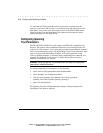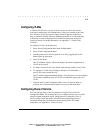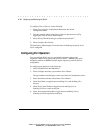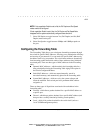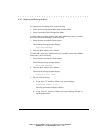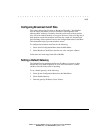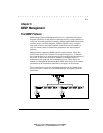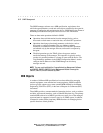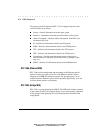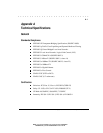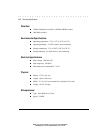
. . . . . . . . . . . . . . . . . . . . . . . . . . . . . .
72141EREKIQIRX
;VMXIV
*VER7TVEKIRW
4VSNIGX
72141EREKIQIRX
'SQQIRXW
*MPI2EQI
CHSG
0EWX7EZIH3R
%1
The SNMP manager software uses a MIB specification, equivalent to that
which the agent maintains, to read and write objects controlled by the agent for
purposes of configuring and monitoring the device. SNMP defines the format of
the MIB specifications and the protocol used to access this information.
There are three main operations defined in SNMP:
■
Operations that read information from the managed device, such as
those used to obtain status or statistical data, are called GET operations.
■
Operations that change a functional parameter on the device, such as
those used to configure Spanning Tree or to initiate a software
download, are referred to as SET operations. GET and SET operations
are initiated only by the manager software, and result in a response by
the agent.
■
The third operation type, the TRAP, allows the agent to send an
unsolicited message to the manager. This operation is typically used as
an alert of a potential problem or a change of status with the device. The
Trap Destination parameter in the SNMP Configuration Menu is used to
configure the IP addresses of the SNMP Manager to which trap
messages are sent.
238)
8LIYWIVQYWXMRWXEPPFSXLXLI'SQTEU2IX[SVOMRK1EREKIQIRX7SJX[EVI
ERH7;7;7;4VSHYGX1EREKIQIRX1SHYPIXSQEREKIXLI
7;7;7;W[MXGLIWF]7214
1-&3FNIGXW
A number of different MIB specifications have been defined for managing
network equipment, some standard and some proprietary. SNMP compliant
devices typically support one or more standard MIBs defined by the Internet
Engineering Task Force (IETF), in the form of Request for Comments (RFC)
documents.
These MIBs provide a common method of managing devices, such as switches
and hubs, and network interfaces, such as Ethernet and token ring. The primary
standard MIB, referred to as MIB-II, provides an overall view of the managed
agent and must be supported, at least in part, by all SNMP agents. In addition,
commercial vendors define proprietary MIB extensions for managing device-
specific functions of their products.



